Long before Christian Bale and Christopher Nolan “re-defined” the Dark Knight on the silver screen came Tim Burton’s BATMAN and the Caped Crusader’s ‘90s sequels, all of which hit 4K UHD on June 4th courtesy of Warner Home Video. Despite the varied quality of the pictures themselves, revisiting them in new 4K transfers proved to be a highly enjoyable experience – with the movies all benefiting from the deeper blacks and higher contrast levels that HDR can provide.
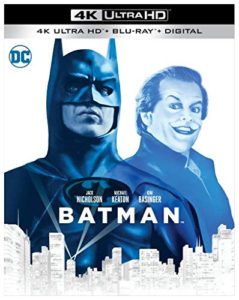 Given the deluge of comic-book flicks we’ve seen over the last two decades, it’s easy to overlook the impact that Burton’s first BATMAN (***, 126 mins., 1989, PG-13) had on modern cinema: this massive blockbuster essentially relaunched the modern super-hero genre single-handedly, giving it a “dark,” edgy visceral presentation in the process which no “funny book” movie had quite possessed before.
Given the deluge of comic-book flicks we’ve seen over the last two decades, it’s easy to overlook the impact that Burton’s first BATMAN (***, 126 mins., 1989, PG-13) had on modern cinema: this massive blockbuster essentially relaunched the modern super-hero genre single-handedly, giving it a “dark,” edgy visceral presentation in the process which no “funny book” movie had quite possessed before.
That’s not to say the original “Batman,” which debuted in Summer ‘89 to enormous box-office receipts, is entirely serious and downbeat: compared especially to Nolan’s movies this “Bat” seems almost lightweight, with Jack Nicholson’s Joker dominating anything and everything on-screen in a story, credited to Sam Hamm and Warren Skaaren, that was obviously reworked to accommodate its top-billed antagonist’s scenery-chewing antics, despite Burton’s claims that his intention was always for Batman to move in and out of the shadows, taking a secondary role to the main story. Nicholson is flamboyantly entertaining but he completely overshadows Michael Keaton’s Bruce Wayne, with Batman relegated to the side, punching the occasional hoodlum and hooking up with ace reporter Vicki Vale (Kim Basinger, who replaced Sean Young after she broke her leg just prior to filming), who’s pursuing a story on Gotham City’s masked hero.
“Batman” is an odd movie in several regards, and only occasionally does it feel like a true Tim Burton movie. With Jon Peters and Peter Guber handling the production, and Burton making his first, large-scale studio blockbuster, it’s apparent that “Batman” received ample creative input from all sorts of forces — most especially Nicholson, who (along with Peters) concocted the film’s climax after having seen Andrew Lloyd Webber’s “Phantom of the Opera” on-stage in London! In the disc’s archival supplements, Burton admits to having the script “get away from him,” but one can sense that it likely happened here beyond the filmmaker’s control. “Batman” was one of the highest budgeted films of its time, and with the studio and producers playing such a hands-on role, only here and there do we see the sorts of artistic flourishes that distinguish so much of Burton’s work — and that especially pertains to the picture’s visuals. Anton Furst’s production design is occasionally evocative, but other sequences in the movie seem so drab and ordinary that you’d never know they were the product of its director simply by their appearance.
On the plus side, Danny Elfman’s thundering, propulsive score is still an outstanding creation, enhancing the action with a thundering, dynamic march that’s the total reverse of today’s “musical wallpaper” approach (as embodied all too well by the Nolan scores of Hans Zimmer and James Newton Howard).
“Batman,” overall, is still quite entertaining in spite of its drawbacks, and Warner’s 4K UHD (1.85) bests its Blu-Ray presentation thanks to its HDR usage and brand-new Dolby Atmos soundtrack, the latter doing an excellent job replicating Elfman’s score with more “oomph” and overhead ambiance than before. Color reproduction especially is more impressive here compared to the past Blu-Ray edition, giving the film a more elegant, and impressive, visual sheen. Extras, as they are throughout the four UHDs, are reprieved from the prior “Motion Picture Anthology,” and are highlighted by “Shadows of the Bat,” a multi-part, comprehensive documentary on the production of the film, utilizing interviews from Burton to Guber, Sam Hamm, Keaton, Nicholson, Basinger, Tracey Walter, Danny Elfman and others; extensive archival materials, including the trailer and Prince’s music videos; a commentary track from Burton; a storyboard for a deleted Robin sequence; and both the Blu-Ray (now sporting, like the other three releases, a 1080p remaster from the same 4K source) and a Digital HD copy.
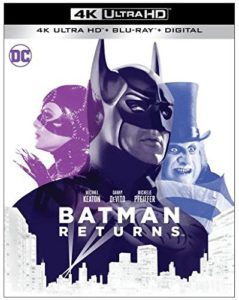 If “Batman” was “Burton Lite,” then BATMAN RETURNS (***½, 126 mins., 1992, PG-13) is most definitely, in every way, a genuine Tim Burton film. It only takes a matter of seconds after the Warner logo appears for one to realize that filmmaker was given full creative freedom here, and the result is a far more satisfying fantasy that remains the finest of all the Batman films for its involving story and captivating, wintry atmosphere.
If “Batman” was “Burton Lite,” then BATMAN RETURNS (***½, 126 mins., 1992, PG-13) is most definitely, in every way, a genuine Tim Burton film. It only takes a matter of seconds after the Warner logo appears for one to realize that filmmaker was given full creative freedom here, and the result is a far more satisfying fantasy that remains the finest of all the Batman films for its involving story and captivating, wintry atmosphere.
The Daniel Waters script deftly intertwines the rise of the Penguin (Danny DeVito) with the birth of Catwoman (Michelle Pfeiffer, who substituted for Annette Bening at the last minute) but the real star here is Burton’s visuals. From the snowy Christmas setting to Bo Welch’s production design, Stefan Czapsky’s cinematography and Elfman’s score (likewise superior to the original), “Batman Returns” is a more interesting, compelling film on every level than its predecessor. In addition to a severe reduction in studio interference, Burton was also aided here by Christopher Walken’s underrated performance as a Trump-like Gotham mogul and a script that even gives Keaton’s Batman more to do once the story gets going, with numerous flourishes of offbeat humor punching up the material (particularly when Bruce Wayne ribs Alfred about letting Vicki Vale into the Batcave!).
Years ago “Batman Returns” was deemed by some as being overly dark and violent for children, and also too much of a product of its director. Seen today, it’s not nearly as graphic as “The Dark Knight,” with Burton’s vision creating a movie populated with heroes and villains both sad and sympathetic, and the rare super-hero film that encourages repeat viewing.
Since Warner’s Blu-Ray transfer of “Batman Returns” was more pleasing than its predecessor, it’s no shock that the sequel’s 4K UHD bests the first “Batman” as well. Again graced with effective HDR usage and warmer colors, this UHD is also capped by a brand new Dolby Atmos soundtrack that strikes the proper balance between music, effects and dialogue. More candid talk about the film’s genesis is on-hand in another robust collection of extras, topped off by Burton’s commentary, all of which reveal how much leeway the director had this time around in bringing his vision to life.
Had Tim Burton continued on with subsequent “Batman” films (something the director surmises the studio didn’t want anyway because of the merchandizing money they lost on “Batman Returns”) it’s possible the series wouldn’t have needed its “creative reboots,” but alas, that wasn’t to be. Burton and Warners handed the series reigns over to Joel Schumacher, whose flamboyant visuals pushed the material away from gothic comic to campy garishness with his two entries, which ultimately ended the series in 1997.
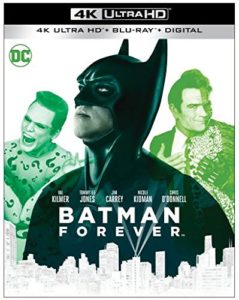 Schumacher’s first foray, BATMAN FOREVER (**, 121 mins., 1995, PG-13), is the worst of the Bat-pics, with Val Kilmer as a sleepy Bruce Wayne and Nicole Kidman disinterested as Bruce’s shrink (and Batman’s girlfriend). Chris O’Donnell’s Robin adds little spice to the proceeding, with most of the shenanigans provided by the movie’s villains: Tommy Lee Jones’ “Two-Face” (a far cry from the disturbing portrait served up by Aaron Eckhart in “The Dark Knight”) and Jim Carrey’s Riddler.
Schumacher’s first foray, BATMAN FOREVER (**, 121 mins., 1995, PG-13), is the worst of the Bat-pics, with Val Kilmer as a sleepy Bruce Wayne and Nicole Kidman disinterested as Bruce’s shrink (and Batman’s girlfriend). Chris O’Donnell’s Robin adds little spice to the proceeding, with most of the shenanigans provided by the movie’s villains: Tommy Lee Jones’ “Two-Face” (a far cry from the disturbing portrait served up by Aaron Eckhart in “The Dark Knight”) and Jim Carrey’s Riddler.
Dominated by ugly, neon-tinged hues that recall the ‘90s at their worst, “Batman Forever” is something of a hybrid between Burton’s original “Batman” and a self-indulgent Schumacher romp, and it’s a borderline-total failure (no) thanks to the script by Akiva Goldsman, which swings and misses in the humor department and brings little to the table for the actors to work with. Elliot Goldenthal’s appropriately blaring score is more over-the-top than Elfman’s and also less satisfying, while the movie’s visuals, from John Dykstra’s effects to Stephen Goldblatt’s cinematography, fall flat after the creative triumph of “Batman Returns.”
Warner’s 4K UHD does the best it can to make the movie’s off-putting visuals palatable in its HDR-enhanced transfer while the bombastic audio design also gets an Atmos makeover. Extras include several deleted scenes, a commentary track from Schumacher, more of the excellent “Shadows of the Bat” documentary, archival featurettes, Seal’s “Kiss from a Rose” music video and other extras.
 The massive commercial success of “Batman Forever” quickly lead to a sequel, and admittedly, there are folks out there who think that BATMAN & ROBIN (**½, 125 mins., 1997, PG-13) is one of the worst films ever made. I have to confess that I’ve always found the movie more entertaining than “Batman Forever,” if only because it feels more genuine: Schumacher wanted a big, campy epic dominated by humor, closer to the ‘60s TV series than any of its predecessors, and while Akiva Goldman’s script again fails to give its stars much to work with, at least “Batman & Robin” is a great deal more energetic than its predecessor.
The massive commercial success of “Batman Forever” quickly lead to a sequel, and admittedly, there are folks out there who think that BATMAN & ROBIN (**½, 125 mins., 1997, PG-13) is one of the worst films ever made. I have to confess that I’ve always found the movie more entertaining than “Batman Forever,” if only because it feels more genuine: Schumacher wanted a big, campy epic dominated by humor, closer to the ‘60s TV series than any of its predecessors, and while Akiva Goldman’s script again fails to give its stars much to work with, at least “Batman & Robin” is a great deal more energetic than its predecessor.
The action once again is dominated (what else is new?) by villains Arnold Schwarzenegger (Mr.Freeze) and Uma Thurman (Poison Ivy), with George Clooney offering a serviceable Batman, even if the character (as he had in basically all three prior films) does little but mope about. As Freeze, Arnold earns every cent of his hefty pay-check, gleefully romping through Gotham City in one his most entertaining performances (“kill the heroes! kill them!”) and Thurman likewise has fun as the sexy Ivy. Fresh off “Clueless,” Alicia Silverstone puts in an appearance in the thankless role of Batgirl (and charmingly has difficulty saying “Al-fred”several times), while Chris O’Donnell phones in another lifeless performance as Robin, and Elle Macpherson adds nothing but window dressing as Wayne’s latest galpal.
As with the case of all the Batman films, this picture suffers from lethargic pacing and a script that needed a rewrite — at 130 mins., it feels half an hour too long, and Goldsman’s script adds a needlessly dour Alfred the Butler subplot that feels at odds with the campy tone of the rest of the picture. Still, it’s fun, though Danny Elfman’s music remains sadly missed — Goldenthal’s score, as with his “Batman Forever” effort, comes across as a heavy-handed, blaring mass of sound, lacking the dramatic flair and texture of Elfman’s works.
Warner caps off their 4K UHD “Bat” releases here with another fine HDR-enhanced HVEC transfer and Dolby Atmos soundtrack, with commentary from Schumacher, one deleted scene, a conclusion to the “Shadows of the Bat” documentary (with Schumacher taking full responsibility for the film’s problems), four music videos, archival featurettes and the trailer putting the finishing touches on 4K releases that should be a must for all Bat-fantatics (note a collected box-set of all the Burton/Schumacher Batmans is also due out in September).
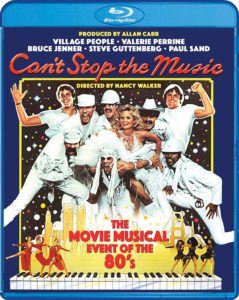 New From Shout! Factory
New From Shout! Factory
If you thought “Xanadu” was the nadir of the Hollywood musical, then you haven’t seen Nancy Walker’s (yes, that Nancy Walker) 1980 fiasco starring the Village People, Valerie Perrine, and the one-two casting coup of Bruce Jenner and Steve Guttenberg. Yes it’s CAN’T STOP THE MUSIC (123 mins., PG), and this glorious Golden Turkey is finally, at long last, on Blu-Ray this month courtesy of our friends at Shout! Factory.
An unbelievable, unforgivable disco turkey that boasts head-turning production numbers (you’ll never think of “YMCA” the same way again), “Can’t Stop” has remained a cult favorite due to its inanity, but with good reason: the widescreen trappings, cast, and the scale of this Allan Carr production are on a higher level than comparable genre exercises like “Thank God It’s Friday,” with the plot and performances matching the overall level of crazy Walker was aspiring for.
Unfortunately for Carr, EMI (which produced the film) and Lew Grade’s Associated Film Distribution (which released it), “Can’t Stop The Music” was a box-office wipeout that came too late to the party. By the time of its 1980 release, disco was well on the way out the door, and this faux story about the formation of the Village People managed to sell some LPs but not nearly enough tickets to prevent it from dooming both the film as well as AFD and EMI’s film division.
Making its Blu-Ray debut from Shout! Factory following an Anchor Bay DVD eons ago, “Can’t Stop The Music” looks and sounds spectacular. This vibrant 1080p (2.35) AVC encoded transfer has nicely saturated colors and detail, along with a rocking choice of either 5.1 or 2.0 DTS MA soundtracks. Either does a fine job conveying the film’s pleasingly wide stereophonic mix, and Shout has sweetened the pot by including new extras: a chatty commentary from veteran comedy writer Bruce Vilanch and Carr documentarian Jeffrey Schwarz lays out the charms of the film and its behind-the-scenes struggle, while a lengthy interview with the Village People’s resident cowboy, Randy Jones, should be of chief interest to fans as it covers the group’s evolution and not just the film’s production.
“Can’t Stop The Music”’s Blu-Ray debut coincides with several new Blu-Ray debuts Shout is releasing to commemorate Pride Month, and includes one other certifiable box-office disaster that’s long been a staple of Bad Movie fans – at least those who have been able to see it.
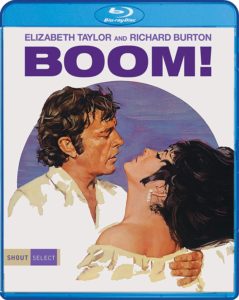 The infamous 1968 teaming of Elizabeth Taylor and Richard Burton with playwright Tennessee Williams, BOOM! (113 mins., PG), was an immediate bust – a disaster about a reclusive rich woman (Liz) — dictating her memoirs to her biographer (Joanna Shimkus, aka Sidney Poitier’s future wife) — who meets her fate when a mysterious stranger (Dick) washes up on the shore of her beautiful, isolated Greek island. His true identity is supposed to be one of the big mysteries of Williams’ work, which he scripted himself for this Joseph Losey film that’s long on endless stretches of dialogue and short on meaningful drama of any kind.
The infamous 1968 teaming of Elizabeth Taylor and Richard Burton with playwright Tennessee Williams, BOOM! (113 mins., PG), was an immediate bust – a disaster about a reclusive rich woman (Liz) — dictating her memoirs to her biographer (Joanna Shimkus, aka Sidney Poitier’s future wife) — who meets her fate when a mysterious stranger (Dick) washes up on the shore of her beautiful, isolated Greek island. His true identity is supposed to be one of the big mysteries of Williams’ work, which he scripted himself for this Joseph Losey film that’s long on endless stretches of dialogue and short on meaningful drama of any kind.
In fact, “Boom!” is one of the worst kinds of cinematic misfires – slow-moving and pretentious, it’s not even so-bad-it’s-good, just a lifeless bore. True, the settings are nice and Douglas Slocombe’s cinematography is terrific, while John Barry’s interesting score is mostly mood music that’s comically turned off (!) in a couple of different places by Taylor herself. Die-hard devotees of Taylor and Burton are most likely to find amusement in “Boom!,” which also features Noel Coward as one of Taylor’s neighbors in a role intended for a woman. That lends some novelty to a film that’s otherwise moribund in nearly every capacity.
Only sporadically available on home video over the years, Shout’s Blu-Ray marks the debut of the film on home video in an impressive and very satisfying 1080p (2.35) AVC encode. Slocombe’s elegant lensing is the primary asset to the film and the scope dimensions do make the film visually compelling, at least for a while. Extras include a commentary from filmmaker John Waters and an interview with critic Alonso Duralde, both of whom are more receptive to the film than I’m willing to wager most viewers will be. A trailer and assorted galleries round out the disc.
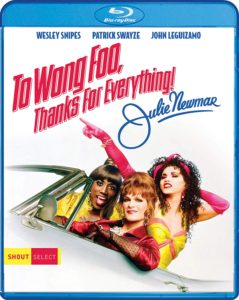 Shout’s two additional Pride Month-themed releases include a Shout Special Edition of TO WONG FOO, THANKS FOR EVERYTHING, JULIE NEWMAR (109 mins., 1995, PG-13), Beeban Kidron’s engaging road trip flick starring Patrick Swayze, Wesley Snipes and John Leguizamo as drag queens who end up stranded in a Midwestern town en route to Hollywood. This Universal/Amblin production receives a brand-new retrospective on the film featuring interviews with Kidron, writer Douglas Carter Beane and Leguizamo, plus a 1080p (1.85) Universal transfer with 5.1 DTS MA stereo sound. Deleted scenes and trailers have been reprised from the DVD…Last but not least is JEFFREY (94 mins., 1995, R), writer Paul Rudnick’s adaptation of his own play about a struggling, gay NYC actor (Steven Weber) who swears off relationships, only to meet a new romantic interest (Michael T. Weiss). Patrick Stewart and Bryan Batt co-star in Christopher Ashley’s filming of Rudnick’s funny, incisive, semi-autobiographical work, captured here by Shout! in its Blu-Ray debut. New commentary from Weber and critic Alonso Duralde, fresh interviews with Weber and producer Mark Balsam, the trailer, still gallery, 1080p (1.85) transfer and 2.0 DTS MA stereo sound mark Shout’s Blu-Ray, out June 11th.
Shout’s two additional Pride Month-themed releases include a Shout Special Edition of TO WONG FOO, THANKS FOR EVERYTHING, JULIE NEWMAR (109 mins., 1995, PG-13), Beeban Kidron’s engaging road trip flick starring Patrick Swayze, Wesley Snipes and John Leguizamo as drag queens who end up stranded in a Midwestern town en route to Hollywood. This Universal/Amblin production receives a brand-new retrospective on the film featuring interviews with Kidron, writer Douglas Carter Beane and Leguizamo, plus a 1080p (1.85) Universal transfer with 5.1 DTS MA stereo sound. Deleted scenes and trailers have been reprised from the DVD…Last but not least is JEFFREY (94 mins., 1995, R), writer Paul Rudnick’s adaptation of his own play about a struggling, gay NYC actor (Steven Weber) who swears off relationships, only to meet a new romantic interest (Michael T. Weiss). Patrick Stewart and Bryan Batt co-star in Christopher Ashley’s filming of Rudnick’s funny, incisive, semi-autobiographical work, captured here by Shout! in its Blu-Ray debut. New commentary from Weber and critic Alonso Duralde, fresh interviews with Weber and producer Mark Balsam, the trailer, still gallery, 1080p (1.85) transfer and 2.0 DTS MA stereo sound mark Shout’s Blu-Ray, out June 11th.
Another excellent “Shout Select” release is the label’s wonderful new double-disc Blu-Ray of EARTHQUAKE (123 mins., 1974, PG) – Universal’s blockbuster which became one of the defining entries in the ‘70s disaster genre, even if the movie itself is, frankly, pretty awful. While the picture still works due to its compelling central concept of “The Big One” shaking Los Angeles from the perspective of an architect (Charlton Heston), his wife (the terrible Ava Gardner), and his lover (Genevieve Bujold), plus a local cop (George Kennedy), a daredevil (Richard Roundtree) and his assistant (Victoria Principal), the George Fox-Mario Puzo script is lackluster. The characters are almost wholly unappealing, and the general treatment of authority figures (the mostly detestable cops, Marjoe Gortner’s gay, unhinged military man) in the post-Vietnam early ‘70s leaves a sour taste.
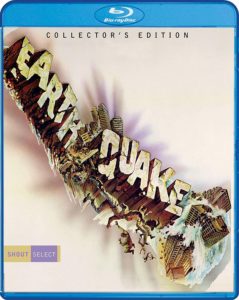 What’s more, after barely establishing the characters, there’s no pay off for most and the movie just ends like the filmmakers threw in the towel and didn’t care. By contrast, the picture fails to match the best of Irwin Allen’s disaster efforts (aka “The Poseidon Adventure” and “The Towering Inferno”), and the unlikable characters cut down on the general “fun factor” a riotously terrible dud like “The Swarm” offers.
What’s more, after barely establishing the characters, there’s no pay off for most and the movie just ends like the filmmakers threw in the towel and didn’t care. By contrast, the picture fails to match the best of Irwin Allen’s disaster efforts (aka “The Poseidon Adventure” and “The Towering Inferno”), and the unlikable characters cut down on the general “fun factor” a riotously terrible dud like “The Swarm” offers.
Nevertheless, there’s a certain charm to “Earthquake” in spite of its abundant shortcomings, especially when you factor in John Williams’ score (not one of his best, but still more than serviceable when you consider what he had to work with) and Albert Whitlock’s effective matte paintings – enough that you can see why audiences of the day ate it up.
Shout’s Blu-Ray is a huge upgrade on Universal’s prior format release, which boasted a dated, ugly old HD master. This new 2K scan (2.35) is leaps and bounds superior in every facet, from its detail to general color and contrast levels. Audio options are robust as well, with the 5.1 DTS MA track offering the closet approximation to the movie’s “Sensurround” theatrical experience thanks to a very active LFE level (there’s also a comparable 2.1 DTS MA mix and a weak 2.0 DTS MA stereo-only soundtrack as well).
Extra features are especially interesting here, highlighted by the presence of the movie’s TV version, which featured some 20+ minutes of new scenes. Regrettably, these sequences weren’t cut from the film, but rather shot specifically for the network TV broadcast, allowing NBC to pad the film out to two nights. While some sequences include new scenes with Principal (sporting a wig) and Gortner, most offer TV staple Debralee Scott riding in an airplane – and all of them are completely disposable (it’s unfortunate NBC didn’t utilize the actual excised scenes from the movie itself, which can be glimpsed in Blu-Ray’s still gallery). That said, the 2K-remastered transfer (1.33) of the broadcast version also looks terrific, even if it’s missing two sequences which Shout’s disclaimer states were absent from Universal’s elements (the not-quite 10 minutes of missing material is included in the supplement, at least, culled from an inferior video tape source).
In addition to a variety of archival promotional materials (trailers, still galleries, audio interviews with the cast), Shout’s package includes three new retrospective pieces: a conversation with Jon Burlingame about Williams’ score, a 10-minute chat with Ben Burtt about Sensurround, and a talk with cinematographer Bill Taylor discussing Whitlock’s legacy. The deleted TV sequences are also available to watch on their own, which is a nice option since it’s hard to imagine many viewers will want to sit through the entire TV cut instead of the theatrical release.
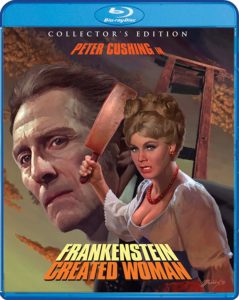 FRANKENSTEIN CREATED WOMAN Blu-Ray (92 mins., 1966): Fourth film in Hammer’s Frankenstein series boasts a slightly more perverted story than its predecessors. Here, Baron Frankenstein (Peter Cushing, appearing slightly more empathetic this time around) revives a young woman (Susan Denberg) who’s drowned herself after her suitor is framed and executed for the death of her innkeeper father. Frankenstein resurrects young “Christina” in an even more perfect form than before – with a lighter hair color and even eliminating a scar on the side of her face – but gets more than he bargained for when her ex-lover’s soul awakens inside her, wanting revenge.
FRANKENSTEIN CREATED WOMAN Blu-Ray (92 mins., 1966): Fourth film in Hammer’s Frankenstein series boasts a slightly more perverted story than its predecessors. Here, Baron Frankenstein (Peter Cushing, appearing slightly more empathetic this time around) revives a young woman (Susan Denberg) who’s drowned herself after her suitor is framed and executed for the death of her innkeeper father. Frankenstein resurrects young “Christina” in an even more perfect form than before – with a lighter hair color and even eliminating a scar on the side of her face – but gets more than he bargained for when her ex-lover’s soul awakens inside her, wanting revenge.
John Elder’s script puts an interesting twist on the Frankenstein mythos with the “creature” here a more physically ideal specimen than its previous body. Under the direction of series veteran Terence Fisher, “Frankenstein Created Woman” has some interesting ideas, but its 1966 release date hampers it from really going bonkers with its vaguely transsexual premise of the slain lover’s spirit revived in his lover’s new body. Either way, the resulting film is sturdy but slow-going, with the “new” Christina appearing at exactly the one-hour mark, leaving little time for the kind of bloody mayhem Hammer fans know and love.
Scream Factory’s Blu-Ray edition of “Frankenstein Created Woman” ranks as one of the label’s best Hammer releases to date. A brand-new 2K scan (1.66) of original film elements results in a pleasingly crisp presentation that’s superior to Millennium’s previous format release, while a new audio commentary from Steve Haberman and Constantine Nasr is filled with trivia on one of Hammer’s most offbeat efforts. Other extras are reprised from prior releases. These include a 45-minute “Hammer Glamour” documentary that interviews numerous Hammer leading ladies plus a commentary with Derek Fowlds, Robert Morris and Jonathan Rigby, along with the trailer, TV spots, a still gallery, and the World of Hammer episode “The Curse of Frankenstein.”
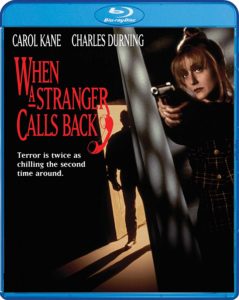 WHEN A STRANGER CALLS BACK Blu-Ray (94 mins., 1993, R): Along with the decent “Psycho IV” and the long-forgotten “Birds II,” “When a Stranger Calls Back” was one of several horror sequels Universal produced for the Showtime cable network in the early ‘90s. Unlike those outings, at least, this is a superior follow-up that, in some ways, is more satisfying than its predecessor, Fred Walton’s 1979 hit “When a Stranger Calls.”
WHEN A STRANGER CALLS BACK Blu-Ray (94 mins., 1993, R): Along with the decent “Psycho IV” and the long-forgotten “Birds II,” “When a Stranger Calls Back” was one of several horror sequels Universal produced for the Showtime cable network in the early ‘90s. Unlike those outings, at least, this is a superior follow-up that, in some ways, is more satisfying than its predecessor, Fred Walton’s 1979 hit “When a Stranger Calls.”
Walton himself returned to write and direct this absorbing, less-schlocky follow up that’s more a thriller than a slasher, as student Jill Schoelen is attacked by a killer that stalks her not once but twice over a period of several years. Carol Kane, now a student advisor, and Charles Durning, the now-retired detective, do their best to help her in a strong sequel that delivers some unsettling shocks even as it reprises the framework of the original. Outside of Schoelen’s wig, this is a solid and underrated follow-up that’s well worth seeing.
Shout’s Blu-Ray includes a 2K scan of original film elements in two aspect ratios: the original, intended 1.33 presentation is the way to go, though there’s also a 1.78 widescreen version that crops the original frame on the bottom and top. A long interview with Schoelen highlights the extras along with talks with Walton and Kane, plus a new scan of Walton’s short “The Sitter.” The DTS MA 2.0 stereo sound is also fine, with composer Dana Kaproff returning to score from the original.
Also New From Shout! Factory: Available this week is the Blu-Ray debut of MIGHTY MORPHIN POWER RANGERS: THE MOVIE (95 mins., 1995, PG), the first big-screen take on the Saban/Toei characters who first became “a thing” in the U.S. back in the ‘90s. This feature-length adventure stars the original Rangers (Amy Jo Johnson’s Pink Power Ranger was always my favorite) as they go up against Ivan Ooze and learn the secrets of the Ninjetti after traveling to a distant planet. Fans of the old show, it goes without saying, will be the biggest fans of this Christmas ’95 Fox release, on Blu-Ray for the first time here with a 1080p (1.85) AVC encoded transfer, 5.1 DTS MA sound, the trailer, archival featurette, and a retrospective “Look Back” sporting interviews with stars Johnny Yong Bosch, Paul Freeman and director Bryan Spicer among others…Simon Fellows’ film A DARK PLACE (89 mins., 2017, Not Rated) is an atmospheric thriller starring Andrew Scott (“Sherlock”) as a sanitation worker in a small town who digs into the disappearance of a young boy he had a friendship with. The actions of the sheriff and the town’s mounting resistance to his efforts power this moody film debuting this week on Blu-Ray from Shout! A featurette and trailer are included with a 1080p (2.35) AVC encoded transfer and 5.1 DTS MA sound…Out June 11th from Shout is SINATRA IN PALM SPRINGS: THE PLACE HE CALLED HOME (92 mins., 2018), director Leo Zahn’s documentary about O’l Blue Eyes and his relationship with Palm Springs – a love affair that began during his brief, turbulent, tabloid-ridden marriage to Ava Gardner, and would last throughout the rest of his life. Wonderful archival footage, interviews and recollections from family and friends mark this tribute to both Sinatra and Palm Springs, captured on Blu-Ray in a 1080p (1.89) transfer with 5.1 DTS MA sound and additional featurettes.
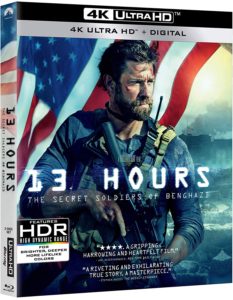 Also New & Noteworthy
Also New & Noteworthy
13 HOURS: The Secret Soldiers of Benghazi 4K UHD Combo Pack (144 mins., 2016, R; Paramount): The true story of how the American Ambassador to Libya, Christopher Stevens, one of his associates, and two contractors for the CIA were assassinated by militants on September 11, 2012 makes for director Michael Bay’s most disciplined picture to date.
“13 Hours,” from Mitchell Zuckoff’s account of what transpired in Benghazi, is a taut and thoroughly compelling film of how several contractors for the CIA – mostly ex-military men played by the likes of James Badge Dale and John Krasinski – were left, basically, to fend for themselves after an attack on Stevens – staying at a private compound nearby an unsanctioned CIA outpost – leaves them scrambling, trying to keep the rest of the workers there alive. Sticking to the facts of what happened that night, Bay and writer Chuck Hogan have fashioned a harrowing profile of the impossible situation the men find themselves in, and the heroism they displayed without the support of additional military personnel that, thanks to bureaucratic higher-ups, never arrived.
While lacking the resonance of, say, Ridley Scott’s “Black Hawk Down” (pretty much the gold standard for modern military thrillers), “13 Hours” nevertheless eschews the standard rah-rah Bay treatment for a docu-drama approach that’s perfectly suited for the material. Recommended viewing on a number of levels.
Paramount debuts “13 Hours” on 4K UHD this month sporting a superior HDR/Dolby Vision-capable HVEC encode and the same Dolby Atmos soundtrack as the Blu-Ray. While a Digital HD copy is included, only the second disc of special features (documentary materials, interviews) from the Blu-Ray is on-hand.
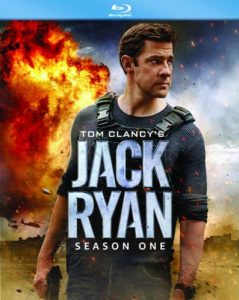 Also new from Paramount is Season 1 of the Amazon series JACK RYAN (400 mins., 2018), the big-budget, polished take on Tom Clancy’s oft-adapted CIA analyst. John Krasinski again proves to be a strong presence, lending a humanistic touch to the character as he’s whisked off his desk job and sent to the Middle East where he has to navigate conflicting interests to stop a terrorist. For those without Amazon Prime streaming (which is where “Jack Ryan” debuted last year), Paramount’s Blu-Ray comes highly recommended, presenting the entire first-season with 1080p transfers and most welcome Dolby Atmos soundtracks. Four deleted scenes are included on the bonus side.
Also new from Paramount is Season 1 of the Amazon series JACK RYAN (400 mins., 2018), the big-budget, polished take on Tom Clancy’s oft-adapted CIA analyst. John Krasinski again proves to be a strong presence, lending a humanistic touch to the character as he’s whisked off his desk job and sent to the Middle East where he has to navigate conflicting interests to stop a terrorist. For those without Amazon Prime streaming (which is where “Jack Ryan” debuted last year), Paramount’s Blu-Ray comes highly recommended, presenting the entire first-season with 1080p transfers and most welcome Dolby Atmos soundtracks. Four deleted scenes are included on the bonus side.
GRETA Blu-Ray Combo Pack (99 mins., 2019, R; Universal): Neil Jordan’s career, like so many directors, has fallen on difficult times in the 21st century, though “Greta” at least gives the one-time “Crying Game” auteur a chance at crafting a modern suspense thriller. Ray Wright’s story, rewritten by Jordan, stars Isabelle Huppet as a lonely French piano teacher whose true motivations (she’s nutty!) manifest themselves once she shows an attachment to a nice New York City girl (Chloe Grace Moretz) who returns her handbag off the subway. Jordan may have been above this kind of material years ago when he was cranking out the likes of “Interview With The Vampire,” but this is a case of a director slumming with B-grade material, even if it reunites him with Stephen Rea – a case of recalling older, better times. Universal’s Blu-Ray boasts deleted scenes, a featurette, a 1080p transfer (2.39), 5.1 DTS MA sound and a Digital HD copy.
A STAR IS BORN: Special Encore Edition Blu-Ray Combo Pack (148 mins., 2018, R; Warner): Bradley Cooper’s remake met with enormous box-office enthusiasm, as well as critics who heaped praise on top of Lady Gaga’s performance, helping propel the film to numerous end-of-the-year award nominations and Oscar nominations.
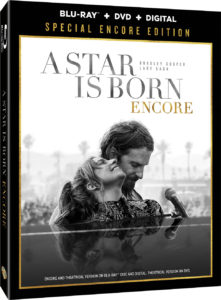 Truthfully, though, this third remake of the 1937 “A Star Is Born” is awfully overrated, as star/director Cooper’s picture feels less like a movie than a group of fragmented scenes without much dramatic shape. The film parades out a number of gritty, realistic concert sequences but never develops much dramatic momentum as Cooper’s hard-drinking rocker takes a shine to a massively talented, aspiring singer (Gaga) – she, in turns, falls for him while instantly generating sparks with the guitarist performing on-stage. As anyone who watched Judy Garland or Barbra Streisand will tell you, the girl becomes a star at the same time her lover eventually hits rock bottom, succumbing to his devices while she ascends to the top.
Truthfully, though, this third remake of the 1937 “A Star Is Born” is awfully overrated, as star/director Cooper’s picture feels less like a movie than a group of fragmented scenes without much dramatic shape. The film parades out a number of gritty, realistic concert sequences but never develops much dramatic momentum as Cooper’s hard-drinking rocker takes a shine to a massively talented, aspiring singer (Gaga) – she, in turns, falls for him while instantly generating sparks with the guitarist performing on-stage. As anyone who watched Judy Garland or Barbra Streisand will tell you, the girl becomes a star at the same time her lover eventually hits rock bottom, succumbing to his devices while she ascends to the top.
Unlike those other films, though, that crucial transition happens at nearly a moment’s notice in the 2018 “A Star Is Born,” and it speaks to the overall thinness of the screenplay, credited to Eric Roth, Will Fetters and Cooper. Cooper spends an awful lot of time on peripheral details (like Gaga’s father, played by Andrew Dice Clay, in a completely pointless performance) and laying out the film’s set-up – so much that when the meaningful, most consequential components of the story finally develop, two-thirds of the film are almost over. It’s an overly restrained film that results in the viewer feeling as if what they’re watching is “authentic,” and yet it’s all simplistically told with characters you aren’t emotionally engaged by. The mostly forgettable soundtrack is another disappointment, with only Gaga’s concluding ballad registering (at least the ’76 Babs version had the Paul Williams classic “Evergreen” going for it).
This “Encore Edition” of the ’18 “Star Is Born” adds some 12 minutes back into the film – these are mostly new or extended musical sequences that don’t change the overall tenor or tone of the film, but might still be of interest for Gaga and Cooper fans. This package is out on Blu-Ray only, offering the same fine transfer and Dolby Atmos audio from the previous release. A DVD (with just the theatrical cut) and Digital Copy round out the “Encore” set.
THE CLEANING LADY DVD (90 mins., 2019; RLJ): Alexis Kendra co-wrote, produced and stars here as an everyday, attractive girl having an affair when her scarred (physically and emotionally) cleaning lady (Rachel Alig) decides to intervene in her illicit relationship. Jon Nautz’s film ups the kill count by way of some grizzly murder sequences but is at least centered by two solid performances – at least until the ending fails to deliver the goods. Still, “The Cleaning Lady” deserves some kudos for trying to interject nuance and character development into its familiar story, resulting in a worthwhile view for hardcore horror fans. RLJ’s DVD is available June 4th featuring a 16:9 (2.35) transfer and 5.1 Dolby Digital sound.
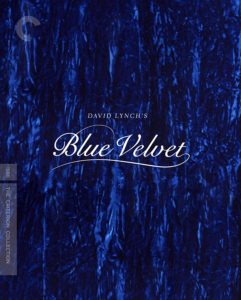 BLUE VELVET Blu-Ray (**, 120 mins., 1986, R; Criterion): David Lynch’s controversial 1986 melodrama-thriller hits Blu-Ray in a new Criterion edition with a 4K remastered transfer and exclusive supplements – all of which should appeal to the director’s devotees.
BLUE VELVET Blu-Ray (**, 120 mins., 1986, R; Criterion): David Lynch’s controversial 1986 melodrama-thriller hits Blu-Ray in a new Criterion edition with a 4K remastered transfer and exclusive supplements – all of which should appeal to the director’s devotees.
Kyle MacLahlan, following through on his confused performance in the notorious “Dune” flop with another Lynch potpourri, plays a guy home from college whose dad is in the hospital. After uncovering an ear in a nearby field, MacLahlan makes the mistake of playing a Hardy Boy and runs into an assortment of nuts as he probes the depth’s of his town’s seedy underbelly, including psycho Dennis Hopper, drug dealer Dean Stockwell, and their cavalcade of fun people. Turns out that hooker/night club singer Isabella Rosselini’s husband and son have been kidnapped by Hopper, and are using her as bait to perform sadomasochistic acts to keep them alive. As MacLachlan heads deeper and deeper into the muck (and shuns good-girl high schooler Laura Dern in the process), he ultimately finds out his desires and voyeurism take him down a long, dark, dirty path.
Lynch’s work, needless to say, is an acquired taste, and while I’ve enjoyed some of his films, I can’t say that “Blue Velvet” qualifies as part of the latter, as I found the movie exceptionally drawn out and with a bare minimum of subtext to chew on. It’s all surface gloss and flashy images, with no genuinely compelling characters, just stereotypes and freaks that you wish would be sucked into the abyss that Laura Palmer ended up in. “Blue Velvet” is one of those movies that completely polarizes viewers: some will find it too gross and sadistic while others will think that it’s a masterpiece that uncovers the underworld hidden in the depths of small-town suburbia. Having already drawn my line in the sand when it comes to most of Lynch’s work, I’m siding on the former side, although you have to give Lynch credit for making a movie that set a kind of standard for countless other suburbia-isn’t-perfect films that have followed over the years since its release.
There are stunning scenes, good performances, and atmosphere to spare, but once “Blue Velvet” settles into detailing Hopper’s antics, the movie bogs down and simply becomes dull, not to mention pointlessly disgusting as it nears the climax. Angelo Balamenti’s moody score (always one of the constant assets in any Lynch project) and the excellent widescreen cinematography by Frederick Elmes lend an able assist, but once you’re turned off by one of the plot points in Lynch’s script, “Blue Velvet” becomes a tiresome, repetitive affair, and I’m afraid I lost interest after the movie hits the first hour mark.
In any event, hardcore Lynch-philes should be thrilled with Criterion’s new Blu-Ray. The 4K remastered (2.35) transfer and 5.1 DTS MA sound were both approved by Lynch, with the original 2.0 mix also included. Extras include 53 minutes of deleted scenes/takes; Peter Braatz’s “Blue Velvet Revisited,” marked by footage shot on-set; a 70-minute doc, “Mysteries of Love,” included on the prior DVD and Blu-Ray releases; a 2019 documentary with crew members and visits to the shooting locales; a 2017 interview with Badalamenti; and Lynch reading from his book “Room to Dream.”
 Warner Archive New Releases
Warner Archive New Releases
Neil Simon movies are a varied lot – a few big hits, a few misses, and a lot of pictures that roll around in a sitcomy kind of grey area make them hard to penetrate today. Though not regarded as one of Simon’s best, THE PRISONER OF SECOND AVENUE (98 mins., 1975, PG) falls somewhere in that latter category, serving up laughs and a tartness through Jack Lemmon’s lead character – a near 50-year-old Manhattan executive who loses his job and finds adjusting to life after gainful employment to be difficult, even with faithful, long-suffering wife Anne Bancroft at his side.
Critics harped on this 1975 Warner Bros. adaptation as being inferior to its source – and perhaps some of the criticism was due to Peter Falk having essayed Simon’s “Mel Edison” on-stage. Lemmon’s neurotic take on this role does come off as overly familiar, with the movie missing Falk’s comparatively “gruffer” persona. That, and the film’s often strident tone, make “Second Avenue” something of a one-note affair – and yet the chemistry between Lemmon and Bancroft, the widescreen lensing, the authentic locations of NYC in the ‘70s and early appearances from the likes of F. Murray Abraham (a cab driver) and Sylvester Stallone (a would-be mugger), soon to explode into stardom, combine to turn the picture into an entertaining view just the same.
Warner Archive’s Blu-Ray debuts the film in high-def thanks to a terrific 1080p (2.40) AVC encoded transfer with mono DTS MA sound, the picture offering a supportive score by Marvin Hamlisch. Note the movie’s anamorphic proportions are compromised in the currently-available streaming version (which crops the film post-opening credits to 1.85), so this Blu-Ray is a must for aficionados of Simon and Lemmon. Extras include a vintage, archival featurette, the trailer, and a segment from “Dinah!” featuring Bancroft and a gag reel from the picture.
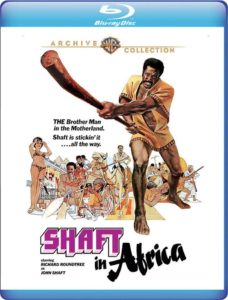 Archive Blu-Ray Debuts: With the second Samuel L. Jackson-led “Shaft” revival due out in theaters in as many decades next week, the Warner Archive has resurrected the ’70s big-screen sequels starring Richard Roundtree for Blu-Ray. Available for the first time in high-definition are SHAFT’S BIG SCORE! (105 mins., 1972, R), which reunited Roundtree with the original’s director, Gordon Parks, and writer, Ernest Tidyman; and the genre switch-up SHAFT IN AFRICA (112 mins., 1973, R). The latter sends our favorite Private Dick overseas to take down an Africa-to-Europe slave trade. John Guillermin took over directorial chores with Stirling Silliphant contributing the screenplay for this 1973 MGM release, the last of Roundtree’s Shaft adventures before the character migrated to a short-lived CBS TV series thereafter. Both Archive Blu-Rays include attractive, nicely detailed 1080p (2.4:1) transfers and DTS MA mono sound…Fans of Italian sword-and-sandal fare should take to the delightfully daffy THE GOLDEN ARROW (91 mins., 1962), a silly Saturday Matinee fantasy that imported Tab Hunter to essay a bandit who steals his way into Damascus in order to participate in a contest for the hand of lovely princess Rossana Podesta. Widescreen Technirama shenanigans, bad dubbing and some colorful action populate this briskly-paced MGM release from prolific director Antonio Margheriti. “The Golden Arrow” is now available from Warner Archive featuring a 1080p (2.35) transfer and 2.0 DTS MA mono audio.
Archive Blu-Ray Debuts: With the second Samuel L. Jackson-led “Shaft” revival due out in theaters in as many decades next week, the Warner Archive has resurrected the ’70s big-screen sequels starring Richard Roundtree for Blu-Ray. Available for the first time in high-definition are SHAFT’S BIG SCORE! (105 mins., 1972, R), which reunited Roundtree with the original’s director, Gordon Parks, and writer, Ernest Tidyman; and the genre switch-up SHAFT IN AFRICA (112 mins., 1973, R). The latter sends our favorite Private Dick overseas to take down an Africa-to-Europe slave trade. John Guillermin took over directorial chores with Stirling Silliphant contributing the screenplay for this 1973 MGM release, the last of Roundtree’s Shaft adventures before the character migrated to a short-lived CBS TV series thereafter. Both Archive Blu-Rays include attractive, nicely detailed 1080p (2.4:1) transfers and DTS MA mono sound…Fans of Italian sword-and-sandal fare should take to the delightfully daffy THE GOLDEN ARROW (91 mins., 1962), a silly Saturday Matinee fantasy that imported Tab Hunter to essay a bandit who steals his way into Damascus in order to participate in a contest for the hand of lovely princess Rossana Podesta. Widescreen Technirama shenanigans, bad dubbing and some colorful action populate this briskly-paced MGM release from prolific director Antonio Margheriti. “The Golden Arrow” is now available from Warner Archive featuring a 1080p (2.35) transfer and 2.0 DTS MA mono audio.
New on DVD: A fascinating anthology film, GANGWAY FOR TOMORROW (69 mins., 1943) is an RKO picture written by radio drama auteur Arch Oboler, following a carpool ride for five strangers headed to work at an airplane plant during WWII. Each story features a different star (Margo, Robert Ryan, John Carradine, Amelia Ward, and James Bell) in a variety of genres (smoky, pseudo “Casabalanca” love story; Ryan as a racecar driver; Bell in a prison-set noir; Carradine in a Capra/Sturges-influenced piece, etc.). John H. Auer helmed this fascinating war-time piece about life on the homefront, debuting this month on DVD from Warner Archive featuring a 4:3 B&W transfer and mono sound…The great (Dame) Judith Anderson frontlined the RKO gangster thriller LADY SCARFACE (66 mins., 1941), the story of a ruthless female Chicago kingpin and the efforts of a detective (Dennis O’Keefe) and his reporter colleague (Frances Neal) to expose her true identity. An interesting if minor affair made noteworthy for Anderson’s performance, filmed inbetween her acclaimed Broadway performances of Lady MacBeth and Medea. Warner’s Archive DVD includes a 4:3 B&W transfer and single channel mono sound.
 Label Wrap
Label Wrap
Lionsgate New Releases: Vincent D’Onofrio steps behind the camera for THE KID (100 mins., 2019, R), the story of a boy (Jake Schur) who tries to save his sister (Leila George) from the clutches of his evil uncle (a change of pace role for Chris Pratt). En route he crosses paths with Pat Garrett (Ethan Hawke) looking for Billy the Kid (Dane DeHaan) in a movie D’Onofrio must’ve cooked up while shooting “The Magnificent Seven” remake. A strong cast is the main reason to check out “The Kid,” which Andrew Lanham wrote from a story credited to him and D’Onofrio. Lionsgate’s Blu-Ray is out June 4th featuring a Making Of featurette, 1080p (2.39) transfer, 5.1 DTS MA sound and a Digital HD copy…Julianne Moore stars as GLORIA BELL (101 mins., 2019, R) in Sebastian Lelio’s film about a free-spirited divorcee who works as an office drone by day and cuts up the rug at an L.A. club once it hits 5 o’clock. Brad Garrett, Jeanne Tripplehorn, Rita Wilson, Sean Astin and Holland Taylor co-star in this nice vehicle for Moore, on Blu-Ray June 4th from Lionsgate sporting a 1080p (2.40) transfer, 5.1 DTS MA sound, a Digital HD copy, commentary from Lelio and a Making Of featurette.
B-horror auteur Daniel Ferrands bites off more than he can chew with the bizarre THE HAUNTING OF SHARON TATE (95 mins., 2019, R), which attempts to put some kind of pseudo supernatural/speculative/whatever twist on the tragic end of the 26-year-old actress, expecting her first baby when she ran afoul of Charles Manson and his cultists. Hilary Duff tries to bring some genuine pathos to Tate but this is a hopeless cause from the get-go, right down to its attempt at a “redemptive”/”spiritual” ending that was understandably panned by most critics. Lionsgate’s Blu-Ray (2.40, 5.1 DTS MA) is out June 4th featuring a Digital HD copy, commentary with Ferrands and the featurette “Premonitions: The Haunting Of Sharon Tate”…Available June 11th is ORANGE IS THE NEW BLACK: SEASON 6 (13 hours, 2018). Picking up a week after Litchfield Penitentiary was infiltrated by an emergency response team, Season 6 finds the ladies torn apart, having to start over with new friendships, allegiances, inmates and guards alike. Lionsgate’s Blu-Ray includes the “Litchfield to the Max” featurette, a gag reel, Digital HD copy, cast/crew commentaries, 1080p (1.78) transfers and 5.1 DTS MA soundtracks.
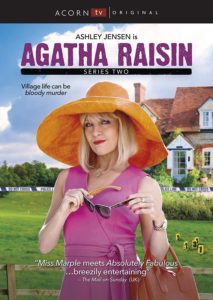 Acorn New Releases: Ashley Jensen returns as AGATHA RAISIN (287 mins., 2018) in the Second Season of the hit series adapted from M.C. Beaton’s bestselling novels. Jensen’s Raisin is a former London PR executive who solves a variety of murder cases in the quaint Cotswolds village she moves to, with the assistance of her friends (Jason Merrells, Mathew Horne, Katy Wix). Three new feature-length cases are on-tap here: The Wizard of Evesham, The Fairies of Fryfam, and The Curious Curate – plus an hour of special features in RLJ’s DVD package, presented with 16:9 transfers and 5.1 sound.
Acorn New Releases: Ashley Jensen returns as AGATHA RAISIN (287 mins., 2018) in the Second Season of the hit series adapted from M.C. Beaton’s bestselling novels. Jensen’s Raisin is a former London PR executive who solves a variety of murder cases in the quaint Cotswolds village she moves to, with the assistance of her friends (Jason Merrells, Mathew Horne, Katy Wix). Three new feature-length cases are on-tap here: The Wizard of Evesham, The Fairies of Fryfam, and The Curious Curate – plus an hour of special features in RLJ’s DVD package, presented with 16:9 transfers and 5.1 sound.
Season 3 of NO OFFENCE (279 mins., 2018) is also new on DVD this month from RLJ and Acorn. In Series 3, Vivienne Deering (Joanna Scanlan) and the team provide security during an election debate when an assassin attempts to carry out his devious scheme. Deering and partner Dinah Kowalska (Elaine Cassidy) are on the case to find the would-be killer in this award-winning series by writer Paul Abbott. RLJ’s DVD boasts 16:9 transfers and 2.0 stereo sound…Adrian Dunbar teams with Carolina Main in BLOOD (288 mins., 2018), the story of a woman (Main) who returns to her small town after the death of her mother, whose seemingly accidental demise doesn’t add up. Could the killer possibly be her doctor father (Dunbar) who she’s mistrusted throughout her life? This slick mystery debuts on Blu-Ray with 1080p (1.78) transfers, 2.0 DTS MA sound, and nearly a half-hour of interviews and behind-the-scenes materials.
Film Movement New Releases: Available June 11th from Film Movement, THE SOWER (98 mins., 2019) is a French picture set during the time of Napoleon. After the men in a remote farming village are sent away after a Republican uprising, “The Sower” finds the remaining female villagers conspiring to share the first man who appears as a lover, in an intentionally revisionist, feminist historical drama by director Marine Francen. Film Movement’s DVD includes 5.1/2.0 French audio, English subtitles, a 1.33 transfer and Francen’s earlier short “Les Voisins” [Neighbors] as a bonus.
Well Go New Releases: Wong Fei Hung is tasked with stopping the shipment of a drug more dangerous than opium in the Hong Kong period effort THE UNITY OF HEROES (104 mins., 2018). Vincent Zhao leads the cast, reprising the role that (among others) Jet Li filled in the mega-popular “Once Upon a Time in China” series. Well Go’s Blu-Ray/DVD combo pack is now available featuring a fine 1080p transfer, DTS MA Mandarin audio and English subtitles.
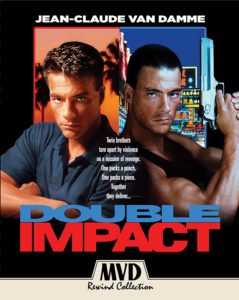 Quick Takes
Quick Takes
DOUBLE IMPACT Blu-Ray (110 mins., 1991, R; MVD): Special “MVD Rewind Collection” package of the 1991 Jean Claude Van Damme outing that offers twice the amount of JCVD as usual – in fact, he plays twins separated by years after their parents’ murder. One’s a SoCal fitness instructor, the other’s a Hong Kong smuggler – but together they wage a two-man assault on the men who murdered their folks. Sheldon Lettich, who guided Van Damme through several of his better outings, helmed this appealing enough if overlong vehicle for the Muscles from Brussels, produced during his “A” heyday. Featuring seemingly the same MGM master as its prior Blu-Ray, MVD’s Rewind disc is chock full of new extras: nearly two hours of documentary interviews with Van Damme, Lettich and cast/crew members are on-hand (in HD); nearly an hour of deleted/extended scenes (in SD); Lettich’s “Anatomy of a Scene,” plus B-roll selections, promo videos, EPK materials, the trailer and PCM stereo sound. Recommended for its maximum Van Dammage!
THE VENTURE BROS. – The Complete Seventh Season DVD (220 mins., 2019; Adult Swim/Warner): The newest season of the popular Adult Swim series offers the episodes The Venture Bros. & The Curse of the Haunted Problem; The Rorqual Affair; Arrears in Scienece; The High Cost of Loathing; The Inamorata Consequence; The Bellicose Proxy; The Unicorn In Captivity; The Terminus Mandate; The Forecast Manufacturer; and The Saphrax Protocol, each in 16:9 widescreen and with 5.1 Dolby Digital soundtracks. The DVD also contains uncensored extras.
PAW PATROL: JUNGLE RESCUES DVD (96 mins., 2014, 2017-18; Nickelodeon/Paramount): Jungle-themed compilation of episodes from the hugely popular Nickelodeon series includes the shows Tracker Joins the Pups!; Pups Save the Baby Humdinger; Pups Save An Upset Elephant; Pups Save Big Hairy; Pups Save Big Paw; Pups Save Monkey-Dinger; and Pups’ Jungle Trouble, all in 16:9 transfers with 5.1 audio. Available June 4th.
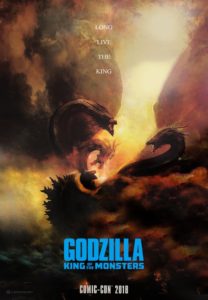 In Theaters
In Theaters
A leaden bust that manages to be somehow even less appealing than Roland Emmerich’s ill-fated 1998 rendition, GODZILLA: KING OF THE MONSTERS (**) gives you more of all the things you never wanted in a Godzilla movie – namely, an anonymous roster of who-cares human characters – and not enough of the things you do.
Sure, this follow-up to Gareth Edwards’ imperfect but vastly more satisfying 2014 “Godzilla” trots out a series of Toho staples beyond the Big G – there’s the empathetic Mothra, villainous Ghidorah (aka Monster Zero), and high-flying Rodan all on-hand for support – but the bland, and badly-shot, monster action is mostly just a running series of peripheral encounters that frame the boring human story.
That end of things proves to be a total wipeout, no thanks to director/co-writer Michael Dougherty. Managing to waste a good cast capable of delivering more, Dougherty and Zach Shields’ script makes the central mistake of following around not just one but two groups of uninteresting characters: there’s slightly crazed scientist Vera Farmiga and daughter Millie Bobby Brown (“Stranger Things”), reluctantly working with eco-terrorist Charles Dance, who thinks the only way to purge the flawed human world is to hand it back to the monsters who once populated it by way of Farmiga’s communication device. Out to stop them (I think) is the Monarch team of Farmiga’s ex, Kyle Chandler, paired up with a returning Ken Watanabe and (briefly) Sally Hawkins, who try and tell their near-worthless leading man that Godzilla is the only salvation the Earth has left.
Just one section of these characters would be sufficient – framing the entire story through Brown’s perspective would’ve made the most sense – but to populate the movie with both of them, not to mention the likes of Zhang Ziyi (apparently playing the “Mothra” twins — or something), David Straithairn (who disappears after having a couple of lines of dialogue), Aisha Hinds (TV’s “9-1-1”), and Thomas Middleditch (TV’s “Silicon Valley”) leads to a overly muddled collage of protagonists where only Bradley Whitford manages to make an impression as one of Monarch’s daffier scientists.
There comes a point about a third of the way through when you realize “Godzilla: King of the Monsters” isn’t ever going to get on-track, and that Dougherty’s clumsy direction and inartful staging of the creature sequences – all of them inexplicably in rain and/or dark – will make viewers pine for Edwards’ frustrating “pulling back” of the monster action in the film’s predecessor. The difference though is that when the previous movie did eventually deliver the goods, it did so in an impressive and rousing fashion; “King of the Monsters” ultimately provides no such emotional release. In fact, it’s missing a whole lot – charm, humor, a sense of wonder and playfulness – all the things that even a group of guys in rubber suits once managed to convey. (131 mins., PG-13)
NEXT TIME: Twilight Time’s latest! Until then, don’t forget to drop in on the official Aisle Seat Message Boards and direct any emails to our email address. Cheers everyone!
